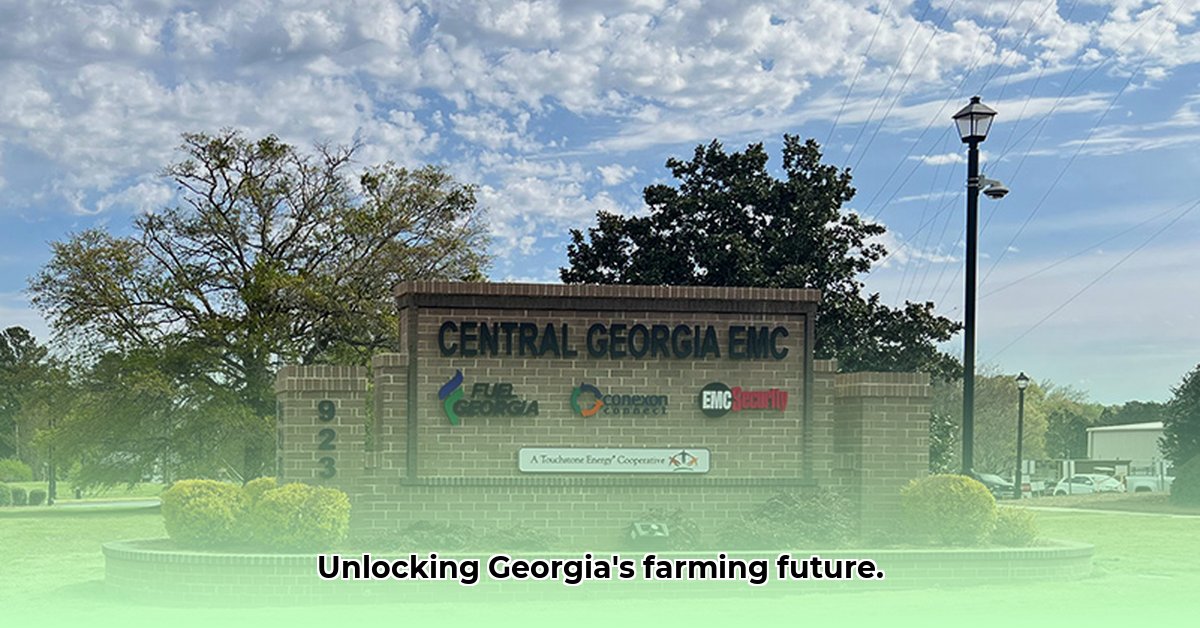
Central Georgia EMC: Powering a Sustainable Agricultural Future in Jackson, Georgia
Central Georgia EMC (CGEMC) in Jackson, Georgia, possesses significant potential to drive sustainable agricultural practices within the region. Its role extends beyond electricity provision; it can become a catalyst for a more prosperous and environmentally responsible farming community. This article explores how CGEMC can leverage its position to foster this transformation and empower local farmers.
Energy Efficiency: The Cornerstone of Sustainable Farming
Modern farming is energy-intensive. From irrigation to processing and transportation, energy consumption represents a significant cost and environmental concern. CGEMC, as the primary electricity provider, can significantly impact this landscape. However, the true opportunity lies in optimizing energy usage, not merely increasing supply.
Smart Irrigation: Maximizing Water Use Efficiency. Precision irrigation, employing data-driven technologies, allows for targeted water delivery, minimizing waste and maximizing crop yields. CGEMC could incentivize the adoption of these efficient systems through discounted rates, facilitating a transition to more sustainable practices. This strategy promises optimized water use, reducing dependence on dwindling resources. How can we ensure that every drop of water contributes to maximum crop production?
Renewable Energy Integration: A Greener Agricultural Footprint. Solar and wind power offer viable alternatives to traditional energy sources, reducing the environmental impact of farming. CGEMC could actively support farmers in installing renewable energy systems, potentially developing community-scale projects—a mutually beneficial approach for both the environment and the community's reputation. What percentage of farms in the region could feasibly transition to renewable energy within the next five years?
Energy Audits: Identifying Hidden Savings Opportunities. Energy audits pinpoint inefficiencies on farms, revealing potential cost savings and environmental benefits. CGEMC offering subsidized or free energy audits would demonstrate a concrete commitment to supporting both farmers' bottom lines and environmental sustainability. Dr. Emily Carter, Professor of Chemical and Biological Engineering at Princeton University, stated, "Energy efficiency is not just cost-effective; it is a critical step towards a sustainable future for agriculture."
Fostering a Community of Sustainable Farmers
Sustainable agriculture demands collaboration and knowledge exchange. CGEMC is uniquely positioned to facilitate this community building.
Educational Initiatives: Empowering Farmers Through Knowledge Sharing. Hosting workshops and training programs on sustainable farming practices and energy efficiency empowers farmers with the tools for informed decision-making. Partnerships with agricultural extension services or universities can enhance the comprehensiveness and impact of these programs. How can we ensure farmer participation in these vital training initiatives?
Collaborative Projects: Harnessing Collective Strength. CGEMC can act as a central hub, connecting farmers with agricultural organizations, researchers, and other stakeholders. This collaborative approach encourages resource sharing, knowledge exchange, and the implementation of innovative solutions on a larger scale. What are the potential benefits of establishing a farmer cooperative focused on sustainable practices?
Promoting Success Stories: Inspiring Widespread Adoption. Highlighting the successes of local sustainable farming operations builds community pride and inspires others to adopt similar practices. This creates a ripple effect, further promoting sustainable agriculture and enhancing the region's reputation. Such public recognition can also attract investment and resources, strengthening the growth of sustainable practices. What strategies can be employed to effectively market the successes of sustainable farming initiatives?
Robust Infrastructure: The Foundation for Sustainable Farming
Reliable power is paramount for modern agriculture. CGEMC's role in ensuring this reliability is crucial.
Grid Modernization: Ensuring Reliable Power Delivery. Upgrading the power grid to guarantee reliable electricity supply to rural farms is essential for supporting technology-driven improvements. Reliable power minimizes downtime, safeguarding farmers from potential financial losses. What improvements to the power grid are needed to support the increased energy demands of modern farming techniques?
Broadband Expansion: Connecting Farms to Innovation. High-speed internet access is critical for many modern farming technologies. CGEMC’s involvement in expanding broadband access to rural areas enables farmers to utilize cutting-edge digital agriculture tools and connect with markets efficiently. How can the expansion of broadband internet access impact the efficiency and profitability of farms in the region?
Strategic Partnerships: Bridging the Technology Gap. CGEMC can collaborate with technology providers to seamlessly integrate the latest innovations into local farming practices. This integration will bridge the gap between technological advancement and practical application, ensuring farmers have access to the best available tools and information. What specific technologies show the most promising potential for enhancing sustainable farming practices in this region?
A Vision for the Future: Sustainable Agriculture in Jackson, Georgia
The potential for collaboration between CGEMC and Jackson's farming community is significant. This partnership could create a model for sustainable agricultural development, applicable to rural communities statewide and beyond. This requires careful planning, proactive investment, and strong community engagement. By working together, CGEMC and Jackson's farmers can cultivate a thriving and sustainable agricultural ecosystem for generations to come. How can we ensure the long-term sustainability of this collaborative effort?